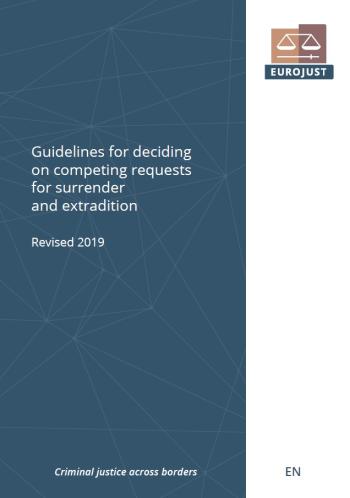
Guidelines for deciding on competing requests for surrender and extradition
View guidelinesArticle 16 of the Council Framework Decision on the European Arrest Warrant and the surrender procedure regulates the decision-making process for the executing judicial authority that receives multiple requests for surrender/extradition of the same person. To support practitioners in the event of multiple European Arrest Warrants (EAWs) and extradition requests, Eurojust published the Guidelines for deciding on competing requests for surrender and extradition.
The Guidelines distinguish different scenarios and suggest factors that must be given due consideration before the executing authority takes a decision on which of the requests it shall execute. The guidelines include the factors mentioned in the framework decision, but complement and develop these factors further in light of the following five scenarios:
- two (or more) arrest warrants issued against the same person for purposes of prosecuting the same crime;
- two (or more) arrest warrants issued against the same person for purposes of prosecution of two (or more) different crimes;
- two (or more) arrest warrants issued against the same person, one (or more) for purposes of prosecution of crimes and one (or more) for purposes of execution of a custodial sentence or detention order;
- two (or more) arrest warrants issued against the same person for purposes of execution of two (or more) custodial sentences or detention orders; and
- one (or more) arrest warrants compete with one or more requests for extradition regarding the same person.
Following their original publication in 2004, the Guidelines were revised in 2019 to take into account developments in the EU Area of Freedom, Security and Justice, as well as the experience acquired by Eurojust during the intervening period. The Guidelines have been frequently used in Eurojust casework and widely disseminated to practitioners. They are available in all EU languages.
The role of Eurojust in competing EAWs
The ultimate decision regarding competing EAWs is made by the competent national authorities of the executing Member State; however, early consultation and decisions made by the concerned Member States are likely to produce a better outcome. Similarly, effective and early coordination between the competent authorities of the Member States concerned, before the issue of an EAW, should minimise the number of cases of multiple requests for the same person.
The coordinating and advisory role of Eurojust can avoid that authorities issue competing EAWs in cases already handled by Eurojust. Through effective and early coordination, the authorities may agree on the way forward together and thus ensure that parallel proceedings do not lead to the issuing of competing EAWs.
In cases where two or more competing EAWs have in fact been issued, the coordinating and advisory role of Eurojust can assist the executing national authority in taking an informed decision on which request should be executed. Once notified, the involved Nationals Desks at Eurojust can immediately liaise with each other, and their respective competent authorities. All possible legal issues are duly examined, and Eurojust can support the competent authorities in reaching a reasoned and informed decision on the competing requests, within the available time limits. As part of the decision-making process, Eurojust can issue a reasoned opinion advising the relevant authority on the execution of the competing requests.
In cases involving countries outside of the Member States, Eurojust is able to rely on its relationships of trust and cooperation, based on Cooperation Agreements concluded with specific third countries. Moreover, Liaison Prosecutors seconded to Eurojust provide a direct link to certain third-country partners.
